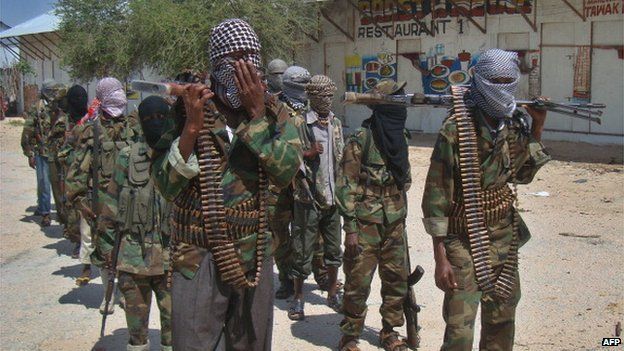Kenya's government has ordered the closure of 13 money transfer firms to prevent militant Islamists from using them to finance attacks, the interior minister has told the BBC.
The bank accounts of 86 individuals and "entities" had also been frozen, Joseph Nkaissery added.
Those targeted are believed to include a Somali-linked bus company and hotel.
An assault by the Somalia-headquartered al-Shabab group killed 148 people at Kenya's Garissa University last week.
Kenyan officials have repeatedly accused Somalis in the country of colluding with the militants.
Nearly 500,000 refugees are in the country - many of whom fled decades of conflict and drought in Somalia.
'Lifeline for Somalis'
Kenya also has its own Somali population - most of whom live in the capital, Nairobi, and in the north-east, where the university attack took place.
Somalis say most of them are law-abiding citizens of Kenya, and they have also bore the brunt of al-Shabab's insurgency.

Al-Shabab carried out its bloodiest attack in Kenya at the university in Garissa
They have condemned the government's crackdown as "blanket punishment" of the community.
BBC Africa's Abdullahi Abdi in Nairobi says a leaked document shows that hotel and transport companies, as well as Muslim clerics and human rights organisations, risk having their bank accounts frozen.
Somalis around the world rely heavily on the informal money transfer firms, known as "hawalas", to do business and to send cash to relatives because of the almost non-existent banking sector in Somalia.
There have been a similar crackdown on the companies in the UK and US.
A spokesman for the Somali money transfer agencies in Kenya, Abdi Ali, told the BBC they would oppose moves to shut them down.
"To us, it is only a ministerial directive which is sent to the central bank. We will talk to the Kenyan government about this issue and use its justice system to settle matter," he said.
The United Nations estimates Somalis in the diaspora send home about $1.6bn (£1.1bn) annually, significantly more than foreign aid.
More than 40% of Somalis receive remittances, the bulk of which are used for basic needs, including food, clothes, medicine and education, according to a UN survey.
Somalia has not had a functioning government since the fall of Siad Barre's government in 1991, and has been hit by religious and clan conflicts.
Latest Stories
-
Kamaldeen Sulemana stars with goal and assist as Southampton beat Swansea in FA Cup
3 minutes -
Zirkzee scores winning penalty as 10-man Manchester United knock out Arsenal from FA Cup
42 minutes -
George Quaye tips Dzifa Gomashie for Tourism Minister position
49 minutes -
MTN FA Cup: Kotoko beat Accerler8z to book last 16 spot
52 minutes -
Free SHS and the NDC’s dilemma: A look into the future
1 hour -
NIB D-G bought state lands at Cantoments for ¢160k – Documents reveal
2 hours -
Dr Arthur Kennedy: A reset for Ghana
2 hours -
Teacher trainees call for resolution of strikes before colleges reopen
3 hours -
National Prayer and Thanksgiving Service to be held today at UPSA
3 hours -
‘Take the naughty, stealing taxes away’ – E.P Church Moderator to President Mahama
3 hours -
Employee Assistance Programmes: The heartbeat of a 24-Hour economy
3 hours -
Atebubu drivers attack Police after suspected robbers killed 75-year-old driver
4 hours -
Ejura Death: Family rejects autopsy report, alleges police brutality
4 hours -
Paramount Chief of Wenchi instructs illegal miners to stop operating in the area
4 hours -
AGRA Board Chair urges partners and MPs to support Ghana’s food systems transformation efforts
7 hours

